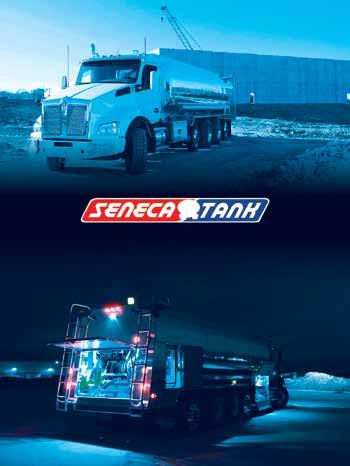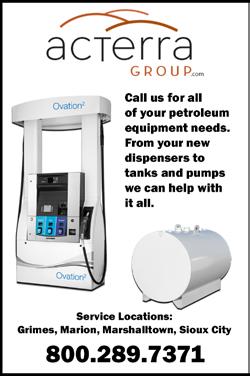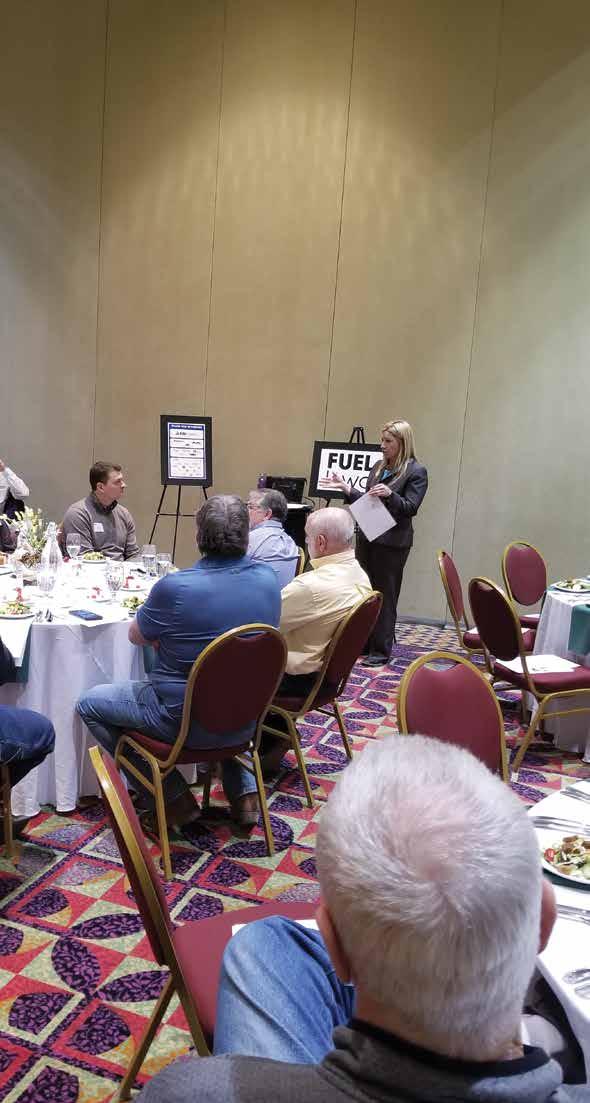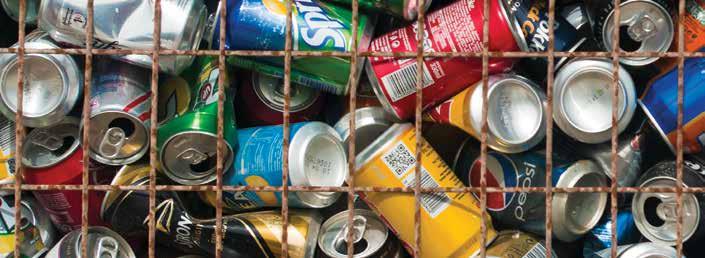
10 minute read
INDUSTRY INSIGHTS
INDUSTRY INSIGHT
experience with skimming devices and can assist law enforcement when a device is discovered.
Advertisement
The Iowa Department of Agriculture and Land Stewardship’s Bureau of Weights and Measures asked FUELIowa to alert retailers of a rise in skimming devices. Recently, Weights and Measures inspectors uncovered five blue-tooth capable skimming devices placed in-line with the wiring of the card reader inside of the dispensers. Last year, Weights and Measures inspections uncovered approximately a dozen skimming devices.
FUELIowa members are encouraged to remain diligent in the security measures taken at their stores. Routine inspection, security tape, and changing out locks are three of the more common means being used by members to prevent skimmers from being placed in dispensers. Members that uncover a device they suspect to be a skimmer are encouraged to contact the FUELIowa staff or the Iowa Weights and Measure’s Bureau before disconnecting the device. In many cases, Weights and Measures staff have more field U.S. EPA’s 2015 Underground Storage Amendments change the way FUELIowa members will oversee their UST systems in the future. By October 13, 2021, FUELIowa members will be required to conduct their first test in accordance with EPA’s guidelines on the following components within their UST system: Release Detection Equipment; Overfill Prevention Devices; Spill Buckets; Containment Sumps used for Interstitial Monitoring of Piping and Under-Dispenser Containments.
WEIGHTS AND MEASURES ALERTS FUELIOWA TO RISE IN SKIMMING DEVICES
PROPOSED EPA UST SYSTEM TESTING: DO YOU KNOW THE REQUIREMENTS?
FUELIowa has summarized the testing requirements that are rapidly approaching. See Proposed U.S. EPA-Manadated Underground Storage Tank System Requirements, page 16. Members are encouraged to contact FUELIowa to discuss the details of their site and identify the best path forward for their business.
U.S. EPA RELEASES E15 EXPANSION RULE WHILE UNDERMINING RFS RIN RULES
The long-awaited proposal allowing gasoline blended with up to 15% ethanol to be sold year-round has been released by the EPA in draft form. This is good news for marketers offering E15 and would allow the blend to be sold year-round to all vehicles 2001 and newer. Currently, during summertime RVP period (June 1-September 15), sales are not allowed in light of the statute limiting the 1-pound RVP waiver only to E10. There was a public hearing March 29 and comments on the proposed rule due April 29. FUELIowa supports the RVP waiver portion of this rule; however, we oppose the RIN reform proposal. RINs represent Renewable Identification Numbers which are the credits the EPA designed to ensure refiners satisfy their obligations under the Renewable Fuels Standard (RFS).
“It is ironic that EPA would propose changes to expand sales of ethanol while simultaneously proposing changes that would undermine the RFS which was designed to expand sales,” said Dawn Carlson, CEO of FUELIowa and RINAlliance which is supportive of yearround E15. “The RIN reform proposal would disincentivize marketers who are successfully blending with ethanol and biodiesel and be counterproductive to the nation’s pursuit of energy independence. Our office has helped marketers, small and large, across the U.S. to achieve success in blending with biofuels and RIN management as the law intended.” With no evidence of RIN market manipulation, EPA clearly is proposing these rules to provide a small number of refiners an opportunity to avoid their obligation under the RFS, as they did when EPA granted the small refinery exemptions. All parties interested in the success of the RFS should come together to oppose the RIN market reform proposal.

On February 19-20, FUELIowa was a participant in a diesel fuel quality workshop hosted by the Fuels Institute in Washington, D.C. The Fuels Institute was founded by NACS in 2013 and serves as a vehicle to bring together fuel supply chain stakeholders in a collaborative setting to address emerging issues within the industry. Diesel fuel quality and related issues have emerged as a strong topic of discussion among industry participants, including end-users. The Fuels Institute’s diesel fuel quality workshop was an effort to assess diesel fuel quality challenges by bringing together representatives from all segments of the industry including refiners, pipeline terminal operators, additive manufacturers, biofuel producers, carriers, bulk storage operators, retail operators, and end-users.
As state and federal policies drive down emission standards for diesel engine manufacturers, manufacturers have turned their attention toward the quality of diesel fuel being supplied to their high-pressure diesel engines. In order to comply with the regulations governing their engines, diesel engine manufacturers argue that they need tighter specifications on the diesel fuel to be consumed in their engines. Engine manufacturers are asking that more strict oversight be given to the diesel fuel moving through the supply chain. This focus has resulted in a number of regulatory initiatives targeting the retail sector of the petroleum industry including tightening the allowable levels of water in storage tanks selling diesel fuel or biodiesel blended fuel; moving from 30-micron filters on retail diesel dispensers to 10-micron filters; and placing the point of compliance for meeting fuel quality standards solely at retail fuel outlets.
800.362.2910 www.senecatank.com

Systems for Tank Truck Unloading & Mobile Fluid Power


In addition to the initiatives outlined above, ASTM Standard D975 (Standard Specification for Diesel Fuel Oils) is currently being evaluated for its applicability with today’s marketplace realities. The Fuels Institute’s diesel fuel quality workshop brought perspectives from each supply-chain stakeholder on the challenges they face as diesel fuel moves through the chain of sale to consumers. Although no single source was identified as the problem during the workshop, the overall outcome of the meeting was positive in that attendees were able to come to a consensus that in order to truly address the quality of diesel fuel moving through the chain of sale, each segment of the distribution chain must do its own work to ensure the quality of the product being passed on to the next supply-chain participant.
The Fuels Institute is currently in the process of collecting diesel fuel sampling data from members of the industry. Once the data is collected and analyzed, the Fuels Institute will release a report documenting their findings. It’s likely that the information supplied will be used in future discussions about revisions to ASTM Standard D975 and other regulatory initiatives.
The posting cycle for OSHA’s workplace injury and illness reporting rule began February 1. OSHA injury and illness recording and posting requirements apply to most establishments (workplaces) with more than 10 employees. OSHA requires employers to record and post all work-related injuries occurring during the previous calendar year. The state of Iowa has its own state OSHA program for private sector employees. As a result, the state of Iowa has its own posting requirements. The following link will direct FUELIowa members to a copy of the posters required by Iowa’s OSHA office. At a minimum, posters must 8.5 x 14 or larger. INSERT Image: Iowa OSHA Workplace Injury and Illness Poster FDA announced these plans in November 2018, but this is the first time the agency presented plans to the White House. The guidelines have already been cleared by the Department of Health and Human Services.
FDA PRESENTS FLAVORED E-CIG BAN TO WHITE HOUSE BY NACS
$6.24B SETTLEMENT IN VISA, MASTERCARD ANTITRUST SETTLEMENT

According to Axios sources, Food and Drug Administration Commissioner Scott Gottlieb handed White House officials a plan to ban the sale of flavored e-cigarettes in c-stores. Gottlieb has described the surge in teen vaping as an “epidemic” and an important public health crisis. Visa, Mastercard and other bank defendants have agreed to a record-breaking settlement in a class-action lawsuit. The defendants have agreed to a $6.24 billion settlement subject to agreement at a hearing scheduled for November 7, 2019. Eligible class participants include merchants accepting Visa and/or Mastercard between January 1, 2004 and January 25, 2019. For more information on the settlement, including your options under the terms of the settlement, visit www.PaymentCardSettlement. com.
The agency’s plan would limit the sale of flavored e-cigarettes (other than mint/menthol and tobacco flavors) to adult only stores or stores with an adult-only section, essentially banning the sale of these products in most convenience stores. The agency would still allow these products to still be sold in vape stores (or other adult-only stores) and the Internet. Under the new FDA enforcement policy, a store that sells flavored e-cigarettes must ask customers for ID cards before they enter the store. To make this happen, the c-store or gas station would need to build a
VISA AND MASTERCARD TO RAISE FEES IN APRIL BY PMAA

in April. Increases on interchange fees, which retailers pay their banks when accepting a card transaction, and fees that the banks pay to Visa and Mastercard for processing payments, will also increase.
The companies justify the increases by claiming security measures must be enhanced to prevent fraud and theft, and they continue to point out that retailers receive more sales if they accept card payments. Yet both saw 33 percent increases in their fourth quarter 2018 net income as compared to Q4 of 2017.
Increasing fees could also cover the cost of the $6.25 billion settlement the companies face after losing a U.S. antitrust case. Although that money had supposedly already been set aside, fees may be increased to also offset costs of antitrust investigations in Europe.
CONGRESS REINTRODUCES BIPARTISAN BILL TO LOWER DRIVING AGE FOR TRUCKERS
During the week of February 25, Senators Todd Young (R-IN) and Jon Tester (D-MT) reintroduced the bipartisan “Developing Responsible Individuals for a Vibrant Economy Act,” also known as the “DRIVE-Safe Act,” and Rep. Trey Hollingsworth (R-IN) reintroduced a companion bill in the House. The bill would allow drivers 18 and older to operate across state lines if they meet rigorous training requirements. The training requirements would include at least 400 hours of on-duty time with 240 hours of driving time with an experienced driver training them. Training would also be restricted to trucks equipped with active braking systems, video monitoring systems and speed Also, that week, House Transportation and Infrastructure Chairman Peter DeFazio (D-OR) and Senator Tom Carper (D-DE), the Ranking Member on the Environment and Public Works Committee announced their support for an increase in the federal motor fuels tax to support the Highway Trust Fund (HTF) in the short-term while Congress determines how to pay for the nation’s infrastructure. A new surface transportation authorization bill, which authorizes the HTF fund, must be passed before the current law expires September 30, 2020.
Chairman DeFazio has called on Congress to bring back earmarks, which he refers to as “Article I projects” bringing back congressional ability to request funding for specific projects in their states or districts. “Why shouldn’t elected representatives, through a transparent process, be able to spend a small amount of money, bring it home, and show people what they’re going to get for a small increase in their gas tax?” Earmarks have been banned since 2011 and will require leadership to allow for them again. On January 1, 2020, the minimum wage will rise from $8.25 an hour to $9.25 an hour, then to $10 an hour on July 1, 2020. Starting in 2021, the minimum wage will jump $1 each January 1 through 2025, when it will reach $15 an hour.
ILLINOIS RAISES MINIMUM WAGE TO $15 BY NACS
The new law gives businesses with 50 or fewer workers a tax credit of 25% of the higher wage cost next year, with that percentage declining over the next few years before eventually reaching zero. Companies can also give those under the age of 18 a lower minimum wage, provided those workers do not exceed 650 hours annually.
Illinois, which joins New York, New Jersey, California and Massachusetts with setting a $15 an hour minimum wage, hasn’t raised its minimum wage in nearly a decade. Chicago had already begun to increase the minimum wage above the state minimum wage.












